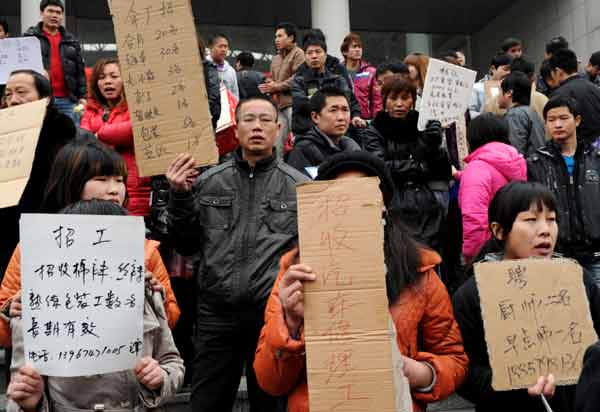Society
Migrants roll back to jobs in cities
By Zheng Caixiong (China Daily)
Updated: 2011-02-10 07:35
 |
Large Medium Small |
| ?
 Recruiters hold up boards with job opportunities at a job market in Yiwu city, Zhejiang province, on Wednesday as the market reopened following the Spring Festival break. Thousands of enterprises from Yiwu and neighboring cities and counties were at the gathering looking to recruit workers. ZHANG JIANCHENG / FOR CHINA DAILY
|
"The train was very crowded and the journey took about a dozen of hours," she said.
Liao, 28, carried her red knapsack out of the railway station and headed for a bus to continue toward her journey's end.
The migrant worker, who comes from Southwest China's Sichuan province, arrived at the shoe factory where she works in Guangzhou's Baiyun district an hour later.
She was part of a flood of migrant workers returning to Guangzhou from their hometowns after spending Chinese New Year with their families.
Guangzhou Railway Group Co reported that more than 700,000 passengers returned to Guangdong province by rail on Wednesday. Some 500,000 passengers arrived at railway stations in Guangzhou on Tuesday. The huge numbers are not likely to fall for at least a week.
Zhang Baoying, director of the service department at Guangzhou job center, said more than 91 percent of the city's migrant workers will return in the month following Spring Festival.
"Only a very small number of migrant workers will not return to Guangzhou after Spring Festival this year," Zhang predicted.
He estimates that about 57 percent, or 1.61 million people, left the city to go home for the holidays centered around Chinese New Year on Feb 3.
The 57 percent who were on the move was slightly down from the more than 60 percent who made the trip last year.
"Guangzhou had registered more than 2.87 million migrant workers by the end of last year, a record high. It was 500,000 more than the number recorded at the beginning of last year," Zhang said.
Zhang said so many workers head for the city because of its improving environment.
The Asian Games that took place in Guangzhou in November greatly improved the city's image and people's feeling of belonging, he added.
Ou Zhenzhi, director of Guangdong's department of human resources and social security, estimates that the entire province will have a labor shortage of about 1 million people in labor-intensive industries.
But the number, which accounts for only 3 to 4 percent of the province's total workforce, is normal, Ou said.
Nationwide, however, the shortage of such workers is becoming more severe. According to an article in the semimonthly magazine Xinhua Wenzhai, the reserve of potential migrant workers has fallen by 20 million people during the past three years.
Experts say the reasons why some potential migrant workers are choosing to stay at home and not make the journey as Liao Fangping did include increasing employment opportunities in the central and western regions and a narrowing of the wage gap between developed cities on the coast and less-developed ones inland.
China Daily
(China Daily 02/10/2011 page3)
| 分享按鈕 |